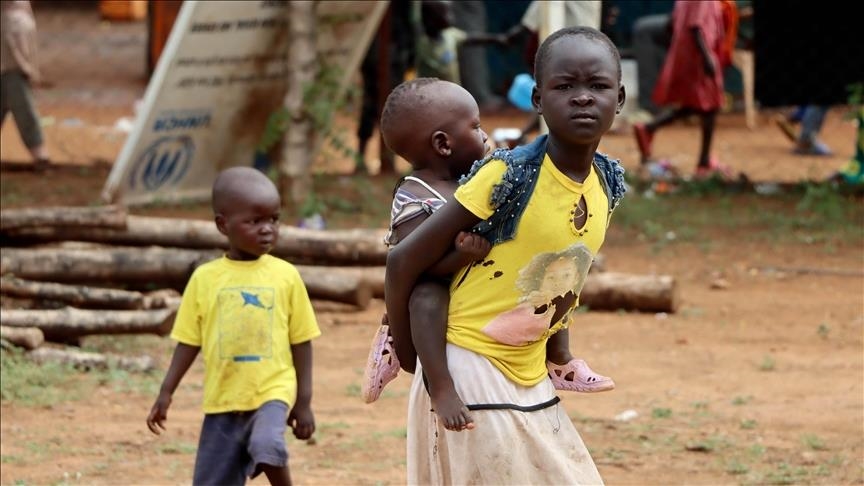MSF Emergency Coordinator for Darfur, Tuna Turkman: The world’s largest humanitarian crisis in Sudan has turned into a major disaster
** MSF Emergency Coordinator for Darfur, Tuna Turkman:
The world’s largest humanitarian crisis in Sudan has turned into a major catastrophe.
– We are in a state of emergency and trying to prevent mass deaths
Urgent efforts must be made to send huge amounts of aid
Thousands of children at risk of starvation
– Acute food shortage crisis has reached catastrophic levels
Many Sudanese are content with one or fewer meals a day
Sudan is facing enormous challenges from civil war, floods and epidemics, amid an urgent need for massive humanitarian and relief assistance.
Tuna Turkman, MSF’s Darfur Emergency Coordinator, highlighted the deteriorating humanitarian situation in Sudan in an interview with Anatolia.
Turkmen said escalating clashes between Sudan’s army and the RSF in the area had exacerbated “the humanitarian crisis and the deteriorating health situation in the country”.
Turkmen, who works in the city of Nyala in Sudan’s South Darfur state, said the humanitarian situation in the area was “deteriorating” and warned of increasing air attacks.
In addition, the unprecedented floods since the eighties of the last century in Darfur have “significantly hampered humanitarian efforts,” he said.
“Our teams are facing great difficulties in operating in areas where there are active clashes.”
Darfur is one of the “most affected areas due to the lack of humanitarian aid, especially since it has not received enough UN relief supplies”, he said.
On the displacement crisis in the country, Turkmen referred to United Nations reports that talked about the displacement of about 11 million people, including two million who fled to neighboring countries, while the rest were displaced to different areas inside Sudan.
El Fasher, the capital of North Darfur state, is “besieged by the Rapid Support Forces (RSF) while heavy fighting is taking place”, he said.
Since May 10, the city of El Fasher has been witnessing clashes between the army and the Rapid Support, despite international warnings of battles in the city, which is the center of humanitarian operations for all states of Darfur (west).
UN and international calls are mounting to end the war to avoid a humanitarian catastrophe that has pushed millions into starvation and death from food shortages due to fighting that has spread to 13 out of 18 states.
Since mid-April 2023, the Sudanese army and the Rapid Support Forces have been fighting a war that has left more than 20,000 dead and nearly 10 million displaced and refugees, according to the United Nations.
**Intertwined crisis
The MSF official said the world’s biggest humanitarian crisis in Sudan had turned into a “major disaster”.
The crisis in Sudan is “intertwined”, he said, noting that emergency relief operations face “huge challenges” with a “completely collapsed health system”.
Turkmen said they face “very big problems in providing medical supplies due to the inability of international and UN staff to reach the affected areas.”
“We are still waiting for WFP trucks to arrive in South Darfur, but they have not yet arrived.”
He pointed out that “security risks and bureaucratic obstacles hindered the delivery of aid from the United Nations and other humanitarian organizations,” which his organization was expecting to reach Sudan.
**Epidemics and famine
On the spread of epidemics, Turkmen said that his organization is combating the spread of malaria in South Darfur.
Efforts to combat the disease are being combated through “the establishment of mobile health points”, he said.
He stressed that “cholera” has spread in 9 states in Sudan, pointing to “measures to control epidemics,” without mentioning them.
On the impact of the crisis on children, Turkmen said that “malnutrition rates among children in South Darfur have exceeded the limits of emergency.”
“The severe food shortage crisis has reached catastrophic levels (…) Food shortages are taking a heavy toll on children.”
He warned that thousands of children are at risk of starvation, noting that many Sudanese are content with one meal or less a day.
“The true magnitude of the crisis is not clearly visible because the situation has not been fully estimated,” he said, adding, “We are in a state of emergency and we are trying to prevent mass deaths.”
He called on international humanitarian organisations, the United Nations and international donors to “make urgent efforts to send huge amounts of aid to Sudan”.
On September 7, the World Food Program said in a post on “X” that the continuation of the war in Sudan exposes half the population to extreme hunger, in the first confirmed famine in the world since 2017.
Sudan has a population of about 49.5 million, according to the latest unofficial estimates.
**Turkish Hospital
Turkmen said that the Turkish hospital in Nyala, which was established by the Turkish Cooperation and Coordination Agency (TIKA) in cooperation with the Sudanese government, continues to provide its services.
The medical team, which received training from the Turkish Ministry of Health (without specifying the period), was able to “provide medical services and operate the hospital throughout the war”, he said.
The hospital was previously staffed by medical staff from Turkey, but the outbreak of war has hampered the dispatch of new medical teams, he said.
“Despite all the challenges, the hospital continues to provide healthcare services to the sick and wounded.”
At the end of his speech, Turkmen referred to the continuous coordination between his organization, the Turkish Ministry of Health and the Ankara embassy in Khartoum to “provide support and assistance” in the humanitarian field in Sudan, saying that this cooperation is “a source of great pride for Turkey.”
In 2014, the hospital was officially opened by Professor Amrullah Eshler, then Deputy Prime Minister of Turkey, under the supervision of TIKA at a cost of $35 million.
The Turkish Hospital in Nyala covers an area of 11,000 square meters and includes 150 beds, including 46 intensive care beds, three operating rooms, two obstetric departments, a radiology department and a laboratory.


